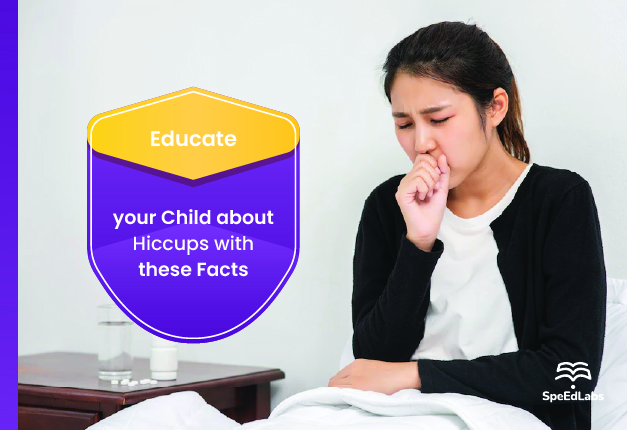There is a good chance that if your child had hiccups, they would have asked you several questions about it.
Their naturally inquisitive minds would ponder one of the body’s most fascinating functions.
The science behind hiccups and how they are created can then be the topic of an interesting conversation with your kids. Along with learning what hiccups are, your child will also gain some insight into how the respiratory and digestive systems operate.
One of the most fascinating yet annoying things that can happen to you is hiccups. When you eat too quickly or too much, you make a funny but painful noise. Sometimes they occur for no apparent reason.
Do you know why we hiccup, though?
Well, a combination of digestive and respiratory processes is to blame. The diaphragm, a muscle with a dome shape at the base of the chest, is what causes it.
Hiccups begin right here.
Usually, this diaphragm performs flawlessly. The diaphragm typically works in the following way: When you inhale, it pulls down to help let air into the lungs. Air leaves the lungs through the nose and mouth as the diaphragm relaxes during exhalation.
The diaphragm becomes irritated because it cannot function normally when you eat too much or too quickly. The result is that the air enters your voice box as opposed to your lungs. As a result, your vocal cords contract and a loud hiccup are let out.
Eating too quickly or excessively, an irritation in the throat or stomach, and experiencing anxiety or excitement are a few things that irritate the diaphragm. The hiccups typically last a few minutes in the majority of cases. The hiccups can occasionally last for days or even months, but this is extremely unusual and is typically an indication of another medical condition.
How to get rid of hiccups?
You have probably heard a lot of advice on how to get rid of hiccups, and you may have even tried some of it. Some people find relief from their hiccups by holding their breath while counting to 10. Some claim that the secret to eliminating hiccups is to drink water from the “wrong” side of a glass.
It might also be effective to put sugar under your tongue. Some people can say goodbye to their hiccups with the help of perhaps the most well-known remedy, which involves having someone jump out and startle you unexpectedly. Boo!
If your child is experiencing discomfort from hiccups, try these simple and safe remedies:
- Have your kid hold their breath while slowly counting to 10.
- Drink a glass of cold water right away.
- Consume one teaspoon of sugar.
- Use medications with caution. Give your child the medication exactly as instructed if the doctor prescribed it. If you believe your child’s medication is causing a problem, contact your doctor right away.
- Encourage your kid to avoid air ingestion. You can instruct your child to eat mindfully and refrain from guzzling food and liquids.
- Chew food completely before swallowing.
- Avoid using a straw when drinking.
- Avoid hard candy and gum.
- Encourage your child to eat smaller meals less frequently.
- Ask your child to refrain from abrupt changes in body temperature, such as drinking a hot beverage followed by a cold one.
- Assist your child in avoiding emotional tension or excessive excitement.
Is it typical for kids to experience hiccups frequently?
In children, especially newborns, frequent hiccups are common, and they typically subside within a few minutes.
Some infants do enjoy getting the hiccups. Your baby can experience multiple hiccups without any problems. However, avoid using the tried-and-true scare-and-hope method. Since there can be multiple causes for the spasm, there is no precise method to determine when hiccups happen. Hiccups can have a variety of causes, including eating or drinking too quickly, which can cause a spasm of the diaphragm. The phrenic nerve or vagus nerve, however, is frequently to blame for persistent hiccups. These are the nerves in charge of the diaphragm’s movement. Your baby experiences hiccups when these nerves are compromised. Any irritation to the eardrum brought on by a foreign object inserted into the ears, throat soreness or irritation, esophageal cyst or tumour, goitre, or gastroesophageal reflux disease can all have an impact on the nerves.
Medical experts say that during the first trimester of pregnancy, your baby may hiccup. However, mothers are unable to feel these minute hiccups until the third trimester. Ensure that the hiccup goes away in under 48 hours. After that, if it persists, it might be a sign of tumours, kidney failure, pneumonia, or digestive problems. You can receive medical attention from a doctor, but it’s unusual for hiccups to be an indication of these conditions.
Also published on Medium.
